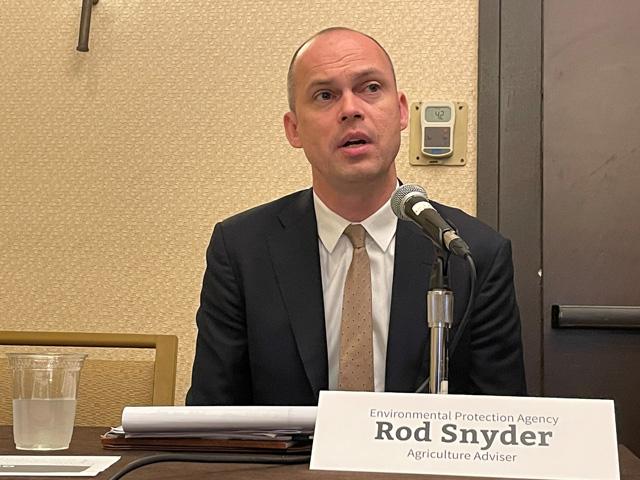WOTUS Rule Proposal Still in Works
EPA's Snyder: Agency Might Release WOTUS Proposal Despite Legal Challenge
ARLINGTON, Va. (DTN) -- EPA intends to put forward a proposal yet this year to rewrite definitions of waters of the U.S., an EPA official said this week during the annual meeting of the North American Agricultural Journalists in Arlington, Virginia.
All eyes are on the second challenge of the Clean Water Act by Michael and Chantell Sackett, Sackett v EPA, likely up for oral arguments before the Supreme Court this fall, which could determine how the law will define wetlands and whether they are jurisdictional under federal law.
Members of Congress and others have pressed the agency to hold off on releasing a proposed rewrite, pending any action by the court in the Sackett case. The court would be expected to rule sometime next spring if oral arguments are heard in either October or November this year.
Snyder said the agency had received more than 120,000 comments in response to an EPA notice of rulemaking issued in December.
Currently, EPA has returned to the pre-2015 definition of WOTUS while working on a broader rewrite.
"So, we are going through a lot of feedback at the moment, and that is going to take time," Snyder said. "I suspect it's still going to be a number of months probably before the next concrete steps, but I do still think there's an interest in trying to get this finalized this calendar year."
Snyder said EPA will be hosting several stakeholder roundtables in May and June, which includes non-government organizations and others.
Though the Sackett case could determine how wetlands fit into the WOTUS picture, Snyder said there are many other concerns about how the law affects farmers and ranchers.
"There are a lot of other issues as you look deeper at the WOTUS concerns that we hear from farmers," Snyder said.
P[L1] D[0x0] M[300x250] OOP[F] ADUNIT[] T[]
"They're not all just around that top-line legal issue. We need to understand the real-life examples of what's happening on the ground, and can other things be done within the rulemaking process that can help make it more efficient to address these concerns?"
Natural Resource Conservation Service Chief Terry Cosby said USDA has a "seat at the table" when it comes to the implementation of the WOTUS rule.
"Our own responsibility under this rule is limited to determinations," he said. "From everything I've seen here, we will continue to work with wetland determinations and work with the landowners."
Cosby said his agency is taking steps to make wetland determinations more accurate. NRCS has taken what Cosby said is a regional approach to wetland determinations.
"Now we're going to have state indicators," he said, which will allow the agency to be more precise in making determinations.
"Farmers enjoy having us out and helping with those. We will continue to work with EPA to make sure that we are out there, and we are the friendly face on the ground."
Senate Ag Committee Chairman Debbie Stabenow, D-Mich., said lawmakers are watching to see how the WOTUS situation plays out, not ruling out the possibility of a legislative fix at some point.
"Well, we're looking to see what the administration obviously is putting forward," Stabenow told DTN.
"Obviously, protecting waters is a big deal in Michigan. We're surrounded by water on three sides, and so making sure our farmers have certainty and clarity but at the same time supporting this precious resource is the balance for me.
"We'll take this step by step, and at this point, we don't have specific legislation that we're looking at, but whatever is done has to be administered in a way that works for our farmers. And so, our farmers are very aware of how we've got to work together to balance this but at the same time not have overreach by the federal government."
House Ag Committee Ranking Member Glenn Thompson, R-Pa., said the uncertainty created by yet another rewrite of WOTUS is hard on farmers and ranchers.
Thompson was one of many members of Congress who recently signed on to amicus briefs in support of Michael and Chantell Sackett in the upcoming Supreme Court case.
He said he's concerned about what a new WOTUS definition would mean for agriculture if it expands the need for farmers to seek more federal permits.
"WOTUS is the single largest private property taking in the history of our country if it would be fully implemented," he said.
Read more on DTN:
"Sacketts See Support on Wetlands Case," https://www.dtnpf.com/…
Todd Neeley can be reached at todd.neeley@dtn.com
Follow him on Twitter @DTNeeley
(c) Copyright 2022 DTN, LLC. All rights reserved.






